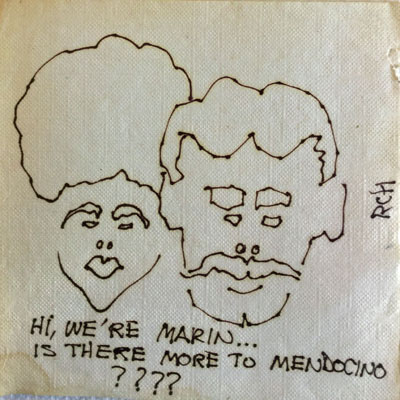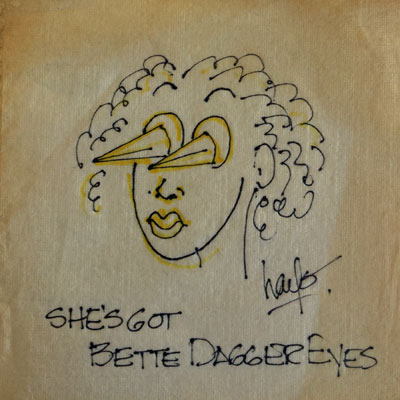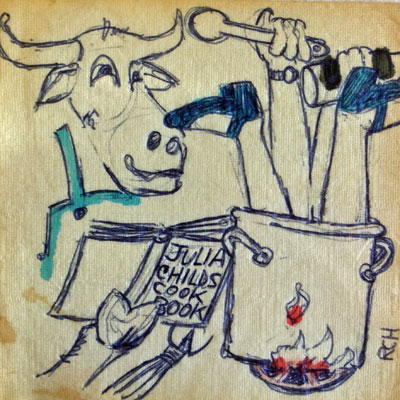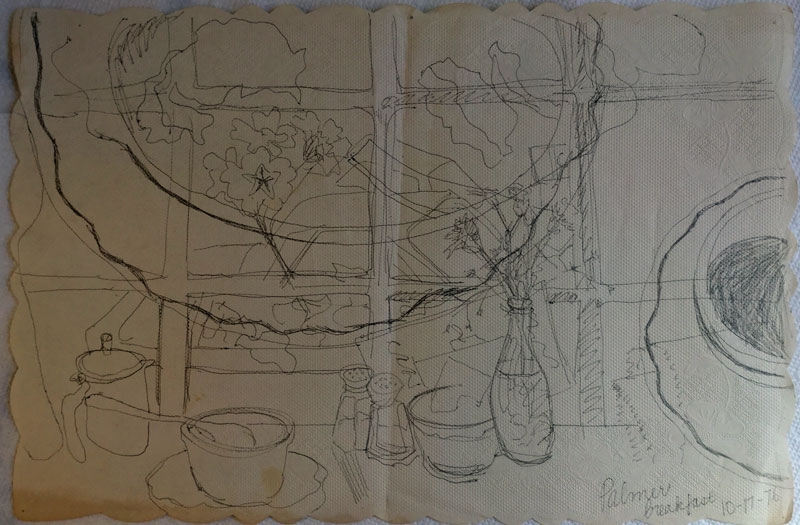Clifford came with the restaurant. He traded errands and odd jobs for food. He could have afforded to pay cash but the Sea Gull was his home and nobody paid cash for food at home. Ice cream and butter were cheaper at Safeway, so Clifford toted them down on his way home after stocking the shelves at the store where he worked. Eventually the commercial dairy put a stop to this “unfair competition” by requiring Safeway to institute a new policy: “no retail for resale even when cheaper than wholesale”. Clifford did it anyway, undercover. He was a renegade.
Clifford’s mother, Dora, lived in the family home on the northeast corner of Ukiah and Howard streets. She walked to the Sea Gull each day for lunch. She hobbled along with a cane, heavily stooped, leaning forward. Lorna, the hostess and cashier, hemmed Dora’s dresses six inches shorter in front to accommodate the stoop. Clifford didn’t live with his mother and seldom ate with her. He slept during the day at his own house in East Mendocino. He worked at night.
Clifford had a habit of doing things that he thought needed to be done, usually without asking. He would fix a piece of equipment, clean a neglected corner or window, dust the pictures, or wash the windows. In the Coffee Shop there were several copper pots and kettles that hung from the ceiling. They’d been acquired over the years by the previous owners, the Halls, and were surrounded by antiques. The locals sitting at the counter stools and tables completed the scene. To someone walking into the Coffee Shop, it felt like stepping into a Breugel painting. From years of cigarette smoke and kitchen grease floating in the air, the pots had developed a unique character, or as Martin liked to say “patina.” Every conversation, every secret offered in confidence, all the flirting between the waitresses and the men who drank their coffee and ate their meals, all of it was absorbed into the patina covering those copper pots and kettles.
One morning when I came over from the house behind the restaurant, I was accosted by the cook, Marlene.
“Have you seen it?”
“Seen what?”
“Just go into the Coffee Shop and take a look.”
I walked into the Coffee Shop and saw Clifford sitting straight and proud on one of the counter stools. Lorna was watching from the register. I didn’t notice anything out of place. That was a relief. I assumed Clifford had brought in something to add to the walls and cabinets. There was so much there already that it would have been impossible to see anything new. Clifford had a devilish smile on his face that I’d seen before when he had secret or a surprise to spring on me. I sat down beside him. He looked up at the ceiling inviting me to look as well.
“Oh my God. Not the copper pots!” I said to myself.
Clifford had cleaned and shined every last one of them! The Coffee Shop, once full of mystery and intrigue, a lion’s den, a secluded room for a sultan’s harem, had been spic and spanned into a Denny’s Restaurant. Cleanliness may be next to godliness but no one, as far as I knew, came into the Sea Gull in search of God. That’s not strictly true. One would-be John the Baptist did sit at the counter awhile back and asked for locusts and honey. It turns out he had just come from beating his wife. Somehow I don’t think cleanliness was at the top of his list.

Napkin Art, Sea Gull Cellar Bar, Roy Hoggard artist
Clifford smiled from ear to ear when he saw that I’d noticed. How could I help but notice! He spoke quietly into my ear. It was the way he usually spoke when he had something important to say.
“Martin and Marlene would never let me do it, but I knew you would like it.”
I looked at him and tried to hide my disappointment. After all, he was only trying to help. I walked back into the kitchen where Helen was rolling out pie dough. All I could think of were the years of history, the stories, and the silent knowledge that clung to those pots slowly working their way through the antiquated pipes that carried Mendocino’s sewage to the ocean. Poor Coffee Shop, so close to God, so far from life.
“Well,” I said.
“That’s a deep subject,” Helen answered.
“Time will replace the patina I guess.”
“It looks cleaner.”
Helen too was a stickler for cleanliness. She approved. She was especially covetous of the space where she rolled out the pies and guarded her rolling pin like the sorcerer guarded his broom. She forbade the use of her rolling pin and her entire baking area for such mundane tasks as rolling out cracker crumbs or setting up the hors d’oeuvres trays. If she found any signs that her orders were ignored, a stray piece of lettuce in a dark corner or an errant cracker crumb on her rolling pin, there was hell to pay. When she came to work you could hear her grumbling when something was wrong. She would turn red and yell: “Damn those waitresses!” the refrain reverberating throughout the restaurant instilling fear in the hearts of even the bravest of the staff. Her dagger eyes were without mercy.

Napkin Art, Sea Gull Cellar Bar, Jack Haye, artist
Helen had a pleasant side and she liked to crack the occasional joke. One of her favorites was to call the scrambled eggs “crazy little mixed up kids.” The cooks at night would take frozen meat from the freezer and let it thaw in stainless steel trays. In the morning the trays were filled with thawed meat and blood. Helen would collect the blood and carry it home to feed her plants but she always insisted with a smile that she wouldn’t think of feeding the pork blood to her Wandering Jews.
The Sea Gull kitchen was unlike other restaurant kitchens. There was a love-hate relationship between everyone who walked in and out yet it worked perfectly. Everyone knew Clifford and understood his strange ways. They let him do whatever he wanted to do and usually it was something that needed to be done.

Napkin Art, Sea Gull Cellar Bar, Roy Hoggard artist
Clifford had a habit of going to funerals. Death was a subject to speak of in a quiet and solemn tone. He would have made a fine undertaker. Instead he stocked the shelves at Safeway. He lived alone most of his life. A few weeks after the fire that destroyed the old restaurant, Clifford handed me a check for $1,000. He wanted to do something and he knew the job of rebuilding would be big. He no longer ate for free in the new Sea Gull. In fact, he seldom ate there at all. He surprised everyone by marrying and acquiring a stepson. He retired from Safeway and traveled all over the country with his new family. He was a kind man and I think he enjoyed his new life. I hope so. Dora died and Clifford followed a few years later. I hope Clifford understands that I don’t attend funerals. I admired him as a decent human being. That seems to me the best tribute that one can pay to the dead.
Note: The featured image is a pencil drawing on a placemat done by Pam Palmer while eating breakfast in October, 1976.


DAVID– YOUR DESCRIPTION OF CLIFFORD IS SPOT ON….AS I AM READING HE COMES TO LIFE…AS DOES WONDERFUL HELEN!
AH NOSTALGIA……..
THE ELEVEN YEARS WE LIVED AND LOVED THE SEA GULL WERE THE HAPPIEST DAYS OF MY LIFE…
THANK YOU FOR THE CHANCE TO BE THERE ONCE AGAIN–IN PRINT… MORE PLEASE
Again, great story. I also recall Clifford and Helen. They definitly unique. Helen’s pies were very good.
Helen’s pies were absolutely the best ever….and it took me a while before I figured out her routine well enough to sneak in and sneak a scoop of her heavenly custard cream used in her cream pies….when it was warm it was pure ecstasy, if there was such a thing, then food crack would be the description….
❤️
Thanks Dana. Cathy has a few stories about you that might be compromising. How much would you pay for me to bury them?
Statute of limitations my man, statute of limitations….though I imagine a few of the waitresses that I used to torment have invested heavily in voodoo dolls..that’s how I explain my arthritis encounters….
Also loved the Clifford ‘pots’ story…when dad told me to wash the car, I should have told him ‘it’s patina”…but then he would have chained me to the dishwashing sink again…..
I do miss your dad.